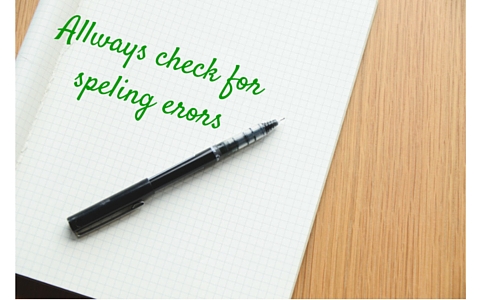In the last couple of weeks, I started to screen CV for a software tester position in my team. Interviewing/screening CV is not new to me. I have done that for several years and I can’t remember how many CVs I reviewed.
Screening CV is an interesting activity (and challenging of course) and I don’t have any problem with it. However, what really bothered me was that the quality of CV didn’t change much in the last few years. I’m not talking about the skills, experience, competence. I’m talking about the way candidates prepared and submitted their CVs to apply for the job.
I see candidates keep making these same mistakes again and again and years after years.
…and I wonder what went through his/her mind when they wrote such CVs and hit submit to apply for the job. Are they too “junior” to make such mistakes? Are they too careless? Do they apply and pray for the best?
I don’t get it.
Anyway, in this post today, I’ll list out 5 minor but deadly mistakes in CV. It means that if you make one of these mistakes, it’s very likely your CV will be ignored.
But before going to these 5 mistakes, let’s clarify this point:
Why mistakes in CV are critical?

When it comes to applying for the job, it seems to me people under-estimate the value of CV.
People more often put too much effort to prepare for the interview and too little effort to write a good great CV.
Preparing for the interview, of course, is an important step but without a great CV where the interview is?
You have a lot of hands-on experience, skills, and certifications under your belt and you’re looking forward to an interview so you can shine. That day will never come if your CV sucks.
The worst part of having a bad CV is this: no interviewer or HR will tell you this.
If you have a bad interview, the interviewer/HR may tell you the reasons why you fail or things you need to improve. I say “may” because if you’re lucky, you’ll have a chance to receive the feedback. However, if your CV sucks, your chance to receive the feedback is zero.
“But why not tell me if my CV sucks?” you may ask
The reason is as you may guess because why would they tell you while they have so many CVs in their hands and their jobs are to pick up the ones that impress them.
By saying this, I’d like to stress the importance of making a great CV and eliminate the mistakes or inappropriate things in the CV to create the best chance for your CV to get attention.
So, here are 5 deadly mistakes to avoid in your CV.
#1: Spelling mistakes/typo

This is one of the biggest surprises for me.
Why?
First, if you have ever searched for CV related guide or advice on the Internet, you should have known that spelling mistake is one of the most common advice for a CV for long time. No matter what language you’re using, spelling mistake is unacceptable.
Second, these days you have a ton of tool to support to check your spelling either online or offline.
If you can’t find a tool or don’t know how to check your spelling in your CV, I’m afraid testing is not for you. Oh, more exactly any job that needs you to use computer.
So if spell checking is such a simple step, why do people keep making this mistake? To be honest, I don’t know exactly why but I can guess:
- They under-estimate the value of the spell check (e.g: They focus more on skills, experience, or certifications in their CVs).
- They’re overconfident in their writing (e.g.: how can I make a spelling mistake in a two-page long CV?).
Why spelling mistake/typo is big no-no?
- As a tester, paying attention to detail is one of the most common traits of a good tester. If you can’t see or check your spelling, how to convince me you’re a good tester.
- Spell checking is a very basic check of every written document. If you don’t check, it tells either you are too lazy or you’re careless.
Here’s my advice:
- Always check your spelling before submitting
- Make sure you do the #1
#2: CV is written in native language.
First off, writing a CV in your native language (in my case is Vietnamese) is not a problem at all. However, writing a CV/cover letter in your native language to apply for a job posted in English and in multi-national company is unacceptable.
Why this is bad?
This will create assumption:
- You’re careless
- You’re not confident in your English
- Not pay attention to detail
My advice:
- Your CV should always be in English unless the job post specifically requires a certain language.
- Proofreading your CV or asking for help from someone.
#3: Formatting is inconsistent
Basically, I don’t care much what CV format or template you’re using.
I don’t care if you’re re-using a template you found on Internet either (I saw some CVs having the same format). However, whatever format/template you’re following, please try to make it consistent.
Reading a CV which is not well-formatted is …well tiresome.
In general, I don’t expect something fancy or artistic. What I expect is a simple, readable, and consistent formatting.
I mean:
- If you’re using bullets for listing, please use it across your CV
- If you’re using numbering for listing, please use it across your CV
- Using the consistent font style/font face for heading or body text across your CV
- Picking a simple font face such as Arial, Calibri
- It’s ok to make a few keywords bold or italic but don’t over-use that.
I can list more but I hope you get what I mean.
Why is this bad?
This will create assumption:
- You’re careless
- Not pay attention to detail
- You’re not so structured
Make reading hard/tiresome
My advice:
- Make your formatting simple, readable, and consistent.
- Proofreading your CV or asking for help from someone
#4: Wording
I occasionally saw CV that some part of the CV, their content is presented in a paragraph without line break for points.
I don’t know why. I don’t know if that’s intentional or it’s a problem of application where they submitted the CV to.
Why this is bad:
This will create assumption:
- You’re careless
- Not pay attention to detail
- You’re not so structured
Make reading hard/tiresome
Here’s my advice:
- Always present your experience/skills with line break, point by point.
- Always submit your CV in.PDF format to make sure the format is not broken or at least export your CV from the application to see what it looks like after exported.
- Proofreading your CV or asking for help from someone
#5: Insert your photo in full portrait
This seems to be a trend these days. Most (if not all) of CV I reviewed have candidate add their photo into the CV in either full portrait or a casual selfie.
Maybe this is just me but I don’t feel comfortable to review such CVs.
These photos look great basically. However, there’s one problem with it: These photos are more suitable to post on Facebook or Instagram, not in the CV.
These photos are too colorful, too personal, and too casual to add to a CV and apply for a professional job.
For example:



I’m not entirely sure why a candidate would do that in their CVs. I assume it’s because doing that would be easier for them because they can easily take a selfie with their phone or pick one of the photos on their phone. Having a professional style seems to be “old fashion” and takes time too.
Why adding a photo is a bad idea?
Disregard the quality of the photo itself, by adding a photo, you give room for the interviewer to discriminate. By adding a photo you disclose your race, your age, your sex, etc. Unless you know the interviewer very well (99% you don’t) and you’re sure your photo will give you an advantage, most of the time, please be careful when you opt to add your photo in the CV.
My advice:
- It’s ok to NOT add a photo in your CV. If you’re not comfortable doing that, you don’t have to do that.
- If you want to add your photo, make sure your photo looks professional (a headshot photo with a solid, light background is good enough)
- Here’s the guide to make a professional photo
Final thought
As you can see, the mistakes I mentioned above seem to be cosmetics and I have to agree that it won’t tell exactly the person you are. However, CV is all about creating a first impression…and you don’t have a second chance to create a first impression.
Let me put it this way:
If you are not making these mistakes, it doesn’t mean your CV will get attention. However, if you make these mistakes, your CV will get ignored.
Even though these mistakes are critical, I believe you can avoid them easily. What you need to do is to be aware of its importance and make a checklist by yourself to make sure to check them in your next job submission.
I hope it helps and I wish you luck!
What other mistakes you often see in the CV? Please put your comment below.

Nice post.